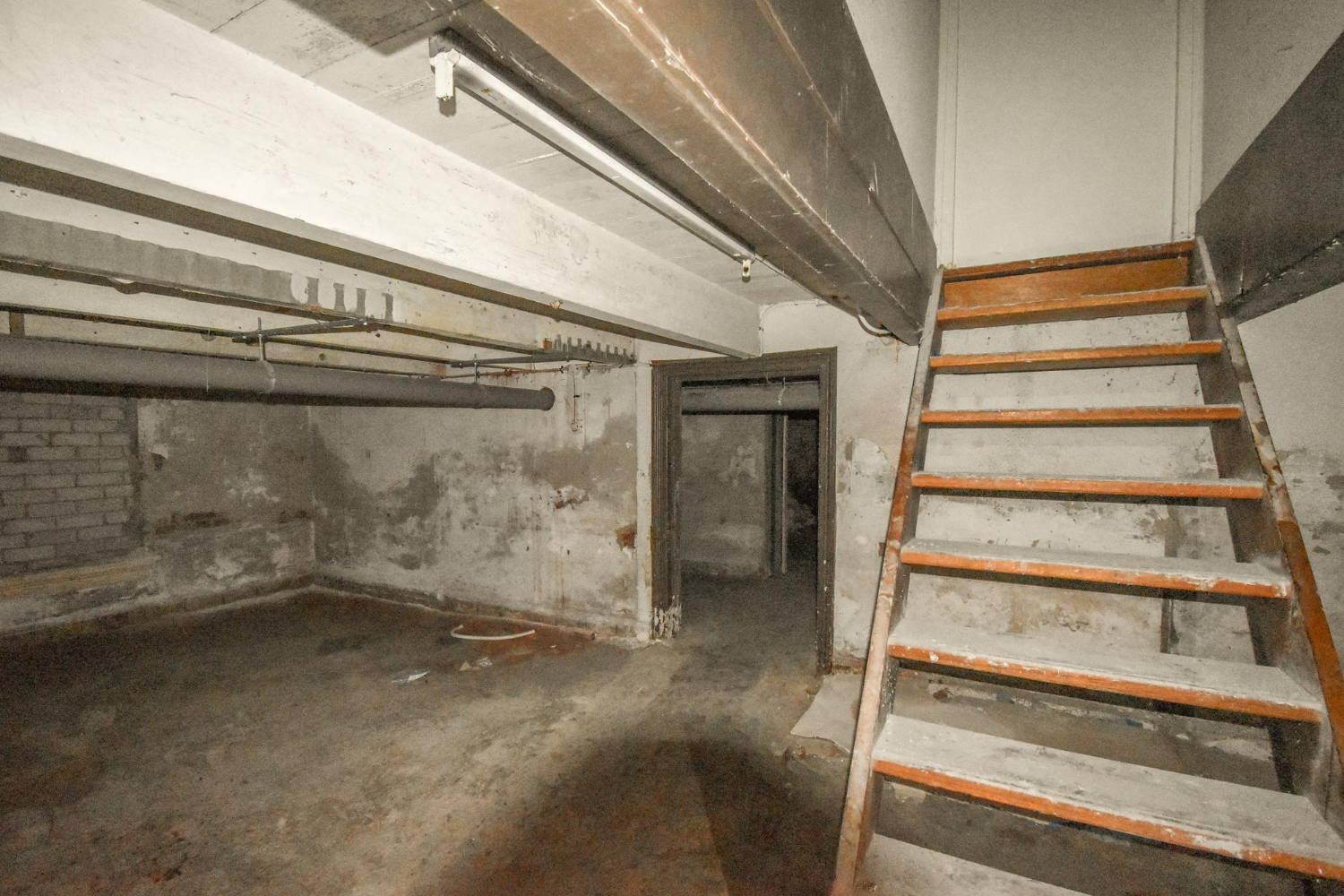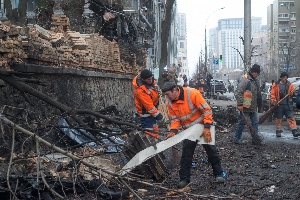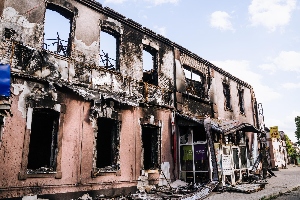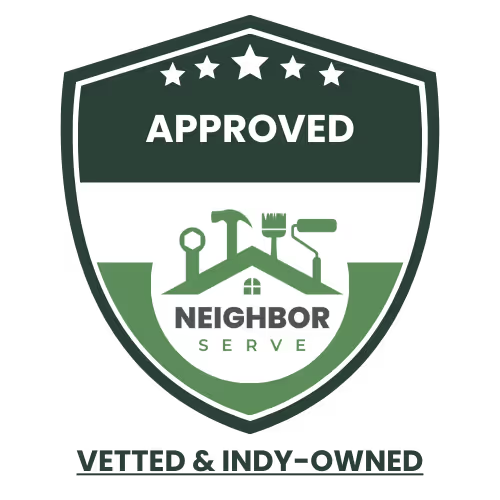A wet basement is more than just a minor inconvenience. It can damage your home's structure, create mold problems, and cost thousands of dollars in repairs if you don't act fast.
The good news is that most wet basement problems can be fixed with the right approach, whether that's a simple DIY solution or professional waterproofing that costs between $2,000 and $10,000 depending on your home's needs. The key is figuring out what's causing the moisture and choosing the right fix for your situation.
In this article, we'll walk you through the most common reasons basements get wet. We'll also explain why waiting makes the problem worse and show you exactly what repair options work best for homes in Indianapolis.
Below, we’ll walk through each important aspect:
- Understanding why your basement is wet
- Why a wet basement can't wait
- How to fix a wet basement in Indianapolis homes
- What basement repairs cost in Indiana
- Who to call and what to expect from a local expert
Keep up, by the end you'll get an idea of what these repairs typically cost. Plus, you'll find out how to choose the right professional to help you get your basement dry for good.
Understanding why your basement is wet
Basement water problems usually come from three main sources: moisture buildup, surface water issues, and structural problems. Each one demands a different solution.
Common sources of moisture and foundation leaks
Humidity and condensation are the most frequent causes of a wet basement. When warm air hits cool basement walls, water droplets start forming on surfaces.
Poor ventilation just makes it worse. Basements without enough airflow trap moisture inside, and that's never good news.
Foundation leaks happen when water finds cracks in your basement walls or floor. These cracks might be:
- Hairline cracks from settling
- Larger cracks from foundation movement
- Gaps around basement windows
- Cracks where the floor meets the wall
Plumbing leaks are another classic culprit. Check pipes, water heaters, and washing machine connections for drips or leaks—sometimes it's the little things that add up.
High groundwater levels can push water through basement walls, especially in areas with heavy rain or poor soil drainage. If you live in Indianapolis, you probably know what that's like.
How surface water and poor drainage cause basement issues
Surface water flows toward your house during rain storms. Without proper drainage, this water ends up in your basement more often than you’d think.
Gutters and downspouts that don't work right dump water near your foundation. The water then seeps into basement walls, leading to that dreaded wet basement.
Grading problems show up when soil slopes toward your house instead of away. This directs rainwater straight to your foundation, which is not ideal.
Damaged drainage systems can't keep up with water flow. Clogged gutters, broken downspouts, and blocked yard drains all spell trouble for your basement.
Window wells collect water if they don't drain properly. Water sits against basement windows and leaks inside, adding to your wet basement woes.
French drains and foundation waterproofing can help redirect surface water away from your home. It's not always a quick fix, but it works.
The difference between seepage and structural water intrusion
Seepage is slow water movement through basement walls or floors. It happens when water pressure builds up outside your foundation.
You might see damp spots, white mineral deposits, or small puddles. Seepage often gets worse after heavy rain and can sneak up on you.
Structural water intrusion is more dramatic—active water flowing through cracks or openings. This creates visible streams or pools of water, and that's when you know you need help.
Structural problems include:
- Large foundation cracks
- Failed waterproofing membranes
- Broken basement windows
- Gaps around utility pipes
Seepage usually needs drainage improvements and waterproofing. Structural intrusion? That calls for foundation repairs and crack sealing.
The type of water problem determines what repairs you need and how much they’ll run you. A wet basement can be a slippery slope, literally and financially.
Why a wet basement can't wait
Water damage creates serious problems that only get worse with time.
Molds can start to develop on surfaces within 24 to 48 hours of water exposure. This rapid growth window comes from guidance by the US EPA, reaffirmed by both industry professionals and research. Early moisture control, drying materials within that timeframe, can prevent mold outbreaks.
Health risks from mold, mildew, and poor indoor air
These fungi spread quickly on damp surfaces like wood, drywall, and carpet—yikes.
Common health problems include:
- Breathing issues and asthma attacks
- Skin rashes and eye irritation
- Headaches and fatigue
- Allergic reactions
Poor indoor air quality affects your whole house. Basement air moves upward through your home's ventilation system, so those mold spores don’t just stay put.
Children and elderly family members face higher risks. Folks with weak immune systems or existing breathing problems can have severe reactions, which is honestly pretty scary.
Most people notice musty smells before they see any visible mold. That smell means mold is already growing somewhere in your wet basement, so don’t ignore it.
Long-term damage to your home's structure
Water weakens your home's foundation over time. Concrete and block foundations develop cracks when water freezes and expands during cold weather.
Structural problems we see include:
- Foundation wall cracks that let in more water
- Rotting floor joists and support beams
- Warped basement floors
- Damaged electrical systems
Wood structures in your basement start rotting when they stay wet. Floor joists, support posts, and wall frames lose their strength, and that can make floors above your basement sag or feel bouncy.
Metal components like pipes and electrical boxes rust quickly in damp conditions. Electrical panels can even fail completely due to moisture damage, which is the last thing you need.
Foundation settling happens when water washes away soil around your home. This causes walls to shift and creates new entry points for water, making your wet basement problem even worse.
What delayed waterproofing can cost you in insurance
Insurance companies see wet basements as preventable. Many policies won't cover water damage from seepage or flooding if you knew about the issue but didn't fix it.
Insurance coverage limits include:
- Gradual water damage is usually not covered
- Mold remediation has low coverage limits
- Structural repairs may be denied if damage was preventable
Document any water issues right away. Take photos and contact your insurance company to report the problem, so you have a record that shows you acted quickly.
Flood insurance requires a 30-day waiting period before coverage starts. Standard homeowner's insurance doesn't cover flood damage at all, which surprises a lot of people.
Claims get harder to file as damage gets worse. Insurance adjusters look for evidence that problems existed for a while without being addressed, so don’t wait to fix your wet basement.
How to fix a wet basement in Indianapolis homes
Indianapolis homeowners face unique challenges with wet basements thanks to the area's clay soil and unpredictable rainfall. Professional waterproofing systems tackle these issues with interior and exterior solutions that work together to keep your basement dry—hopefully for good.
Interior vs. exterior waterproofing systems explained
Interior waterproofing works from inside your basement to manage water that's already gotten in. We install drainage systems along the foundation walls that collect water and direct it to a sump pump.
This approach includes sealing cracks and applying waterproof coatings to walls. Interior systems cost less and work year-round, which is a lifesaver in Indianapolis weather.
Exterior waterproofing stops water before it even reaches your foundation. We excavate around your home's exterior and apply waterproof membranes to foundation walls.
This method also involves installing exterior drainage systems. Exterior waterproofing costs more but gives you better long-term protection against a wet basement.
Most Indianapolis homes need both systems working together. Interior systems handle immediate water issues, while exterior systems prevent future problems—it's a team effort.
Clay soil around Indianapolis holds water longer than other soil types. That makes exterior waterproofing especially important if you want lasting results and a dry basement.
Do sump pumps and French drains solve the issue?
Sump pumps remove water that collects in your basement's lowest point. We install them in a pit where water naturally flows during heavy rains, and they’re a must for any wet basement.
Modern sump pumps include backup power systems for Indianapolis storms. They turn on automatically when water levels rise and shut off when things calm down.
French drains collect water before it enters your basement. We install these underground drainage systems around your foundation's perimeter to keep your wet basement under control.
French drains work especially well in Indianapolis because they handle the area's heavy spring rains. They redirect water away from your foundation, which is what you want.
Neither system works alone for complete basement waterproofing. Sump pumps need drainage systems to collect water effectively, and French drains need proper outlets to move water away from your home.
We design systems that combine both for maximum protection. If you want to stop having a wet basement, this is the way to go.
Why professional basement waterproofing matters
Professional waterproofing companies understand Indianapolis soil conditions and local building codes. We identify the exact source of water entry that homeowners often miss, which is super important.
DIY repairs usually just address symptoms, not the real causes. This leads to repeated wet basement problems and higher costs down the line—ask us how we know.
Professional installation includes proper drainage slopes and waterproof materials. We use commercial-grade sealants that last longer than stuff from the hardware store.
Licensed contractors provide warranties on their waterproofing work. This protects your investment and ensures repairs meet local standards, so you can breathe a little easier.
Professional assessment reveals foundation problems that cause water entry. We fix structural issues alongside waterproofing for a complete solution to your wet basement.
Experienced contractors know which waterproofing methods work best in Indianapolis homes. This knowledge saves time and prevents costly mistakes, which everyone can appreciate.
What basement repairs cost in Indiana
Basement repair costs in Indiana range from $600 for minor fixes to $10,000 for major waterproofing projects. Indianapolis homeowners typically spend between $1,083 and $10,831 on foundation repairs, with water damage repairs averaging $4,000 to $7,000 for a 1,000 square foot wet basement.
According to This Old House (July 2025), professional basement waterproofing typically costs between $2,500 and $8,200, with an average near $5,200. Similarly, Angi (May 2025) reports an average of $5,217, with a range of $2,458–$8,179.
Pricing factors specific to Indianapolis properties
Indianapolis properties face unique challenges that impact repair costs. The city's clay soil expands and contracts with weather changes, putting extra stress on basement walls and contributing to wet basement issues.
Soil conditions significantly impact pricing. Clay-heavy soil in Marion County requires more extensive waterproofing solutions than sandy soil, especially for a persistent wet basement.
Property age matters for cost calculations. Older Indianapolis homes often need more comprehensive repairs due to aging foundation materials and, you guessed it, a higher risk of a wet basement.
Basement size directly affects total costs. Water damage repairs cost $4 to $7 per square foot in our area, so a bigger wet basement means a bigger bill.
Common Indianapolis repair types include:
- Foundation crack sealing
- Sump pump installation
- Interior drainage systems
- Exterior waterproofing
Seasonal factors influence pricing too. Spring repairs often cost more due to higher demand after winter freeze-thaw cycles, when wet basements are at their worst.
Hidden expenses in waterproofing projects
Many Indianapolis homeowners discover unexpected costs during basement repairs. We recommend budgeting an extra 20% for these surprise expenses—seriously, it happens more than you'd think.
Professional inspection fees run $200 to $500 before any work begins. This assessment identifies all problem areas that need attention, including hidden sources of a wet basement.
Permit costs vary by project scope. Indianapolis requires permits for major structural work, adding $100 to $300 to your budget.
Mold remediation becomes necessary when water damage sits untreated. This process can add $500 to $3,000 to repair costs, especially in a chronically wet basement.
Utility relocation happens when drainage systems interfere with existing pipes or electrical work. Budget $300 to $1,200 for these modifications—it's not glamorous, but it's often needed.
Floor replacement sometimes follows major water damage repairs. New concrete floors cost $3 to $8 per square foot, and that's before you even think about finishing the space.
Planning a realistic repair budget for your home
Start budgeting by getting multiple quotes from licensed Indianapolis contractors. We suggest comparing at least three estimates for accurate pricing, especially for wet basement repairs.
Minor repairs like crack sealing cost $600 to $1,500. These fixes are for small foundation issues without major water problems.
Moderate projects including interior waterproofing range from $1,900 to $6,500. This covers most basement water issues Indianapolis homeowners face, especially if your wet basement isn't out of control yet.
Major renovations with extensive exterior work reach $10,000 or more. These projects handle severe foundation damage or complete waterproofing systems for the most stubborn wet basements.
Payment options help manage costs. Many contractors offer:
- Monthly payment plans
- Seasonal discounts
- Insurance claim assistance
Set aside emergency funds for unexpected discoveries. Indianapolis basements often reveal additional problems once work begins, especially if you've had a wet basement for a while.
Who to call and what to expect from a local expert
When water starts appearing in your basement, getting professional help quickly prevents bigger problems. A skilled basement specialist can identify the real cause and create a plan that works for your specific situation.
When it's time to contact a basement specialist
Water damage can spiral out of control before you know it. If you spot standing water, damp basement walls, or those stubborn white mineral stains on your foundation, it's probably time to talk to a basement specialist.
Call immediately if you notice:
- Water pooling on the basement floor
- Wet spots on walls after rain
- Musty smells that won't go away
- Cracks in foundation walls
If you're seeing these warning signs, don't just cross your fingers and hope for the best. Water problems in the basement can move fast through concrete and mess with your home's structure before you realize it.
A basement specialist has tools most of us can't keep in the garage. They use moisture meters, thermal cameras, and other gadgets to hunt down hidden leaks that regular plumbers might miss.
Sure, a plumber is great for a leaky pipe, but basement waterproofing takes a different kind of know-how. These experts understand how water sneaks through foundations and what it takes to actually fix the problem.
What basement specialists do differently:
- Find the source of water entry
- Check foundation drainage
- Test soil conditions around your home
- Plan long-term solutions
If you've ever wondered whether a basement specialist is worth it, think about the peace of mind. Basement waterproofing isn't just about patching a crack—it's about protecting your whole home from future headaches.
And if you live in Indianapolis, basement waterproofing is almost a must. The weather here just loves to test your foundation.
What happens during a Michaelis waterproofing inspection
Michaelis starts every job with a thorough inspection. We don't just glance around—we check your basement from top to bottom to track down exactly where water is getting in.
The inspection usually takes about an hour, give or take. We'll look at your foundation walls, floor joints, and even poke around the outside of your home for clues.
We also check your gutters and downspouts, since they're often the sneaky culprits behind basement water issues.
Our inspection covers:
- Foundation cracks and joints
- Basement windows and doors
- Sump pump operation
- Exterior drainage systems
We use special equipment to find moisture you can't see. Thermal cameras help us spot wet areas behind walls, and we'll test the soil around your foundation too.
After the inspection, we break down what we found in plain English. You'll get a written report showing the problem spots and our honest recommendations for basement waterproofing.
We lay out your options for repairs—some things need a quick fix, but other issues call for a permanent basement waterproofing solution. We'll explain the costs and what you can expect from each choice.
Honestly, it's not always easy deciding on repairs. But knowing your options helps you make a smart call for your home.
Why Indianapolis trusts Michaelis for wet basement repair
Indianapolis homeowners keep coming back to Michaelis for wet basement repair, and there's a reason for that. We've been fixing basements here for decades, so we really get the local soil quirks and foundation headaches that come with living in Indiana.
Our team sticks with proven basement waterproofing methods that actually work in Indiana's wild climate. Freeze-thaw cycles? Yeah, we've seen how they mess with foundations and know which solutions hold up best.
What sets us apart:
- Local experience since 1990
- Lifetime warranties on major work
- Licensed and insured contractors
- Free estimates with no pressure
We back up our basement waterproofing with real warranties, not just empty promises. When we install a system, the protection even transfers to new homeowners if you ever sell—pretty handy, right?
Our contractor selection process is tough because we want only the best working on your basement repair. Every team member gets ongoing training in the latest waterproofing techniques, and we're fully insured to keep your property safe during repairs.
Most basement waterproofing jobs wrap up in just a day or two. We always clean up after ourselves, and you'll get some simple maintenance tips to keep your basement dry for years.
If you're in Indianapolis and worried about water, basement waterproofing from Michaelis is a call worth making. Don't let those small leaks turn into big regrets.
Conclusion
A wet basement isn't a permanent problem, even if it feels overwhelming at first. With the right approach and tools, basement waterproofing can actually be pretty straightforward.
Quick action really does save money. The longer we wait, the more basement water damage can creep into our home's structure and belongings.
It's important to know when to call basement waterproofing experts. Some jobs just need skills and equipment most of us don't have tucked away in the garage.
The cost of basement waterproofing depends on how bad the basement water damage is. Quick repairs might be a few hundred bucks, but major basement waterproofing projects can run into the thousands.
Honestly, prevention is way better than repairs. Regular checks of gutters, grading, and your foundation can stop basement water damage before it even starts.
When you spot water in your basement, don't wait. Mold can grow fast in damp spaces, and that's a health risk nobody wants—not to mention the extra cost to fix it later.
For insurance? Document everything. Snap photos and keep every receipt from basement waterproofing or repair work; you never know when you'll need them.
A dry basement adds real value to your home. It means extra living space, less stress about basement water damage, and better protection for your stuff.
With a bit of planning and the right help, you can turn a wet basement into a dry, useful space. The trick is to jump on basement waterproofing as soon as you spot a problem—don't put it off.
Schedule your wet basement inspection today with Michaelis and get expert recommendations tailored to your home.




.avif)

